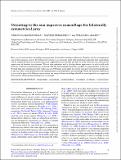Files in this item
Orienting to the sun improves camouflage for bilaterally symmetrical prey
Item metadata
| dc.contributor.author | Mavrovouna, Veronica | |
| dc.contributor.author | Penacchio, Olivier | |
| dc.contributor.author | Allen, William L. | |
| dc.date.accessioned | 2021-09-28T16:30:15Z | |
| dc.date.available | 2021-09-28T16:30:15Z | |
| dc.date.issued | 2021-09-21 | |
| dc.identifier | 276022171 | |
| dc.identifier | 7edeaa58-9b4e-46a2-a33a-9f0f056a4138 | |
| dc.identifier | 85121123109 | |
| dc.identifier | 000728145600002 | |
| dc.identifier.citation | Mavrovouna , V , Penacchio , O & Allen , W L 2021 , ' Orienting to the sun improves camouflage for bilaterally symmetrical prey ' , Biological Journal of the Linnean Society , vol. Advance Articles , blab130 . https://doi.org/10.1093/biolinnean/blab130 | en |
| dc.identifier.issn | 0024-4066 | |
| dc.identifier.uri | https://hdl.handle.net/10023/24037 | |
| dc.description.abstract | Here, we investigate the camouflage consequences of animal orientation behaviour. Shadows can be a conspicuous cue to the presence of prey. For bilaterally symmetrical animals, light field modelling indicates that camouflage will be improved when an animal orients its longitudinal axis directly towards or away from the sun, because the appearance of shadows is minimized. We test this prediction with a field predation experiment, in which wild birds hunt for artificial camouflaged prey oriented with the longitudinal axis either parallel or perpendicular to the sun. We find that prey oriented parallel to the sun are 3.93 times more likely to survive than prey oriented perpendicular to the sun. This result demonstrates the strong orientation dependence of camouflage. Given the dramatic difference in survival of prey with different orientations, we suggest that camouflage should be investigated as an important determinant of the positional behaviour of animals. | |
| dc.format.extent | 6 | |
| dc.format.extent | 257085 | |
| dc.language.iso | eng | |
| dc.relation.ispartof | Biological Journal of the Linnean Society | en |
| dc.subject | Antipredator | en |
| dc.subject | Camouflage | en |
| dc.subject | Countershading | en |
| dc.subject | Orientation | en |
| dc.subject | Predation | en |
| dc.subject | Visual ecology | en |
| dc.subject | QL Zoology | en |
| dc.subject | DAS | en |
| dc.subject.lcc | QL | en |
| dc.title | Orienting to the sun improves camouflage for bilaterally symmetrical prey | en |
| dc.type | Journal article | en |
| dc.contributor.institution | University of St Andrews. School of Psychology and Neuroscience | en |
| dc.identifier.doi | 10.1093/biolinnean/blab130 | |
| dc.description.status | Peer reviewed | en |
| dc.identifier.url | https://academic.oup.com/biolinnean/advance-article/doi/10.1093/biolinnean/blab130/6373266#supplementary-data | en |
This item appears in the following Collection(s)
Items in the St Andrews Research Repository are protected by copyright, with all rights reserved, unless otherwise indicated.

